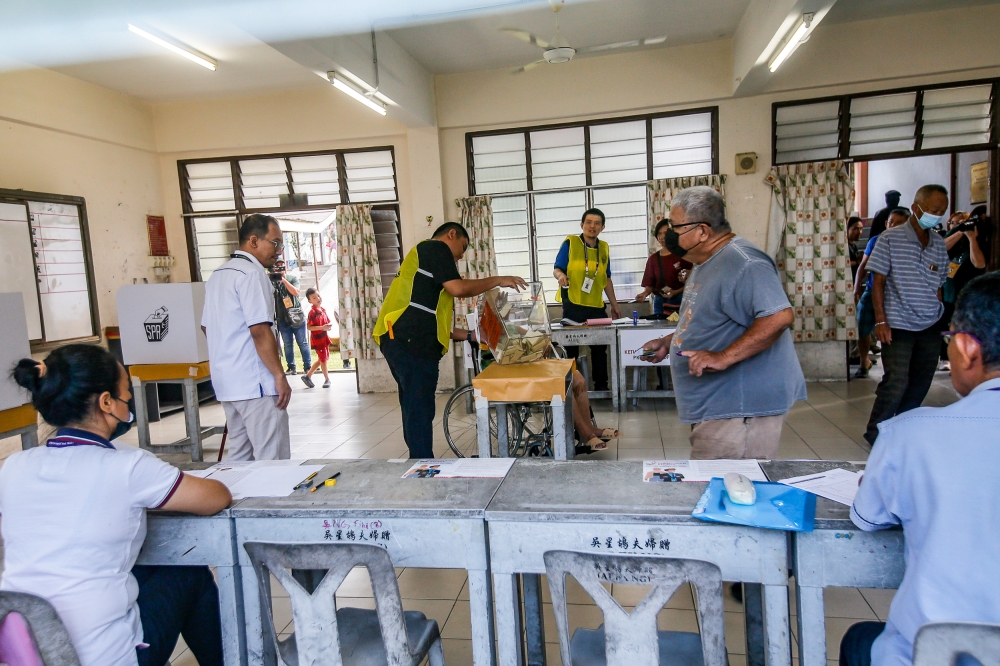KUALA LUMPUR, May 13 — Perikatan Nasional (PN) has reached a fork in its election campaigning with the recently-ended Kuala Kubu Baru by-election in Selangor and needs to rethink its strategies on what really appeals to Malaysian voters, especially its Malay core group, political analysts said.
Speaking to Malay Mail, Nusantara Academy for Strategic Research senior fellow Azmi Hassan said the support of Malays towards PN’s “green wave” has hit a saturation point due to the coalition’s campaign strategy.
The “green wave” phenomenon refers to the surge in Malay-Muslim conservatism as championed by PN.
“The momentum of the green wave hasn't seen much movement until yesterday. It seems that the support of Malays for PN's green wave has reached a saturation point. However, the main issue lies not in this saturation point, but rather in PN's campaign strategy, which focuses on vernacular schools,” Azmi said when contacted.
He said that when PN harped on the Pakatan Harapan (PH) candidate Pang Sock Tao’s Chinese education background and her former position as a special officer to Housing and Local Government Minister Nga Kor Ming, the strategy was to appeal to Malay sentiments.
But such a stance can alienate Chinese voters, Azmi said, adding that when PH’s base of supporters feel their rights are threatened, they will be moved to go out to vote.
“While they aim to court and gain sympathy from non-Malay voters, their approach scares them off. Therefore, the blame is on PN’s strategy, nobody else,” he said.
Despite the overall low turnout in Kuala Kubu Baru last Saturday at 61.51 per cent of its registered voter population, Azmi noted that support among PH supporters in each district polling centres remained consistent compared to the last state elections in August 2023.
He said PN should adopt a moderate approach, akin to Umno when it used to face DAP which generally takes a moderate stance.
This, Azmi said, is likely to deter non-Malay voters.

“Umno and Bersatu have done it before, and so can PAS. It is about employing strategies that do not alienate non-Malays. While it may be challenging for PAS, Bersatu has the potential to be moderate,” he said.
On the other hand, the head of the History Programme at the Research Centre for History, Politics and International Affairs, Universiti Kebangsaan Malaysia Suffian Mansor said the strategy PN could employ is to conduct a more comprehensive campaign and refrain from using old tactics that have diminished support for PN.
Like Azmi, Suffian said PN has hit the saturation point as its campaign for the Kuala Kubu Baru by-election was unable to garner much support despite grievances among Umno supporters towards the PH-DAP candidate.
“The situation in Selangor differs from that in the eastern and northern states of the Malaysian peninsula. Consequently, the campaign struggles to gain significant support, despite grievances among Umno supporters towards the PH-DAP candidate.
“This is attributed to the efforts by the Madani government to assist the people, which has garnered some credit for PH among Malays,” Suffian told Malay Mail.
On the other hand, International Islamic University Malaysia’s political analyst Syaza Syukri said the next strategy for PN is to campaign on inclusivity to garner non-Malay support.
She added that PN leaders likely recognise that the coalition needs to broaden its appeal.
However, she said the move would contradict their current rhetoric.
“Maybe they should stick to their current agenda and just hope for the growing Malay population to agree with them,” she told Malay Mail.
Asked whether PN could effectively reach out to non-Malays, given its composition of a Malay-based party and PAS as an Islamist party, Syaza said it was doubtful.
“I do not think they can. That's why, even before they announced their candidates, I said the best option for them would still be to field a Malay candidate, as they are unlikely to gain non-Malay support even if they nominate someone from Gerakan.
“Even with a Gerakan candidate last year, they still received 10,000 votes. Bersatu, to be candid, remains uncertain. They aim to be a Malay party but also take pride in their affiliations. While they could include associate members, a non-Malay Bersatu or Gerakan would still largely align with PAS, which is Malay-Islamist,” she added.





















